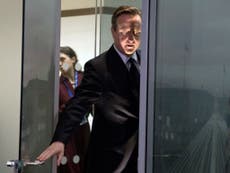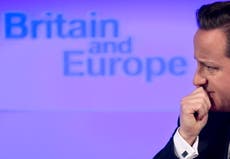EU referendum: If Cameron thinks this vote will be like Scotland’s, he’s wrong
Inside Westminster


When he needs some relief from the increasingly nasty headache of renegotiating Britain’s EU membership terms, David Cameron takes some comfort from the Scottish referendum last year. At the crunch, the Scottish people voted for the status quo (plus a bit of reform, with more power devolved to Scotland) and shied away from the risk of a leap into the unknown.
Downing Street aides see parallels between the two referendums – a revealing sign that they do not believe the Great Renegotiation will be enough to persuade the public to remain in the EU, and that the campaign will have to be won on “big picture” arguments about economic security.
In Scotland, those who opposed the status quo, the Nationalists, failed to spell out a clear enough vision of what life would be like outside the club they wanted to leave. They struggled to answer key questions about whether an independent Scotland would keep the pound or be a member of the EU. Today the Out camp in the EU debate avoids painting a detailed picture of life outside the bloc, and struggles to explain why on earth the 27 remaining countries would give a breakaway UK a good deal on trade and other matters. They would fear “contagion”, with other governments coming under pressure to get a new deal and hold a British-style referendum.
Another parallel is the temptation for pro-Europeans to warn the public against a leap in the dark. In Scotland, the scaremongering was dubbed “Project Fear” and, despite the eventual decision to stay in the UK, was often seen as counterproductive. Number 10 officials insist the Prime Minister is not trying to re-run the Scottish referendum or arguing for the status quo—which is just as well, since most voters are not starry-eyed about EU membership and want real reform. His aides say there is no room for complacency when the opinion polls are on a knife edge, as he reminded his EU counterparts at the Brussels summit which ended on 18 December. This is a more productive argument than threatening to lead the Out campaign if they do not give in to his demands (which no one believes he would ever do). Indeed, Mr Cameron’s trump card is that, after a euro crisis, migration crisis and security crisis, EU leaders are desperate to avoid a “Brexit” crisis, which would be another big brick out of a crumbling EU wall.
The cross-party In campaign is worried by the parallels being made with Scotland. One pro-EU figure said: “There is a similar argument that, on balance, the economic benefits of staying outweigh the risks of leaving. But it is dangerous to read too much into the Scottish referendum. Some people in Downing Street seem to have forgotten the wobble when the opinion polls were close and they feared it could be lost.”
Both sides in the EU battle try to learn lessons from Scotland. Both seek to “own” the issue of patriotism, which the Nationalists captured last year. The Out camp’s latest video is about the “heroes” of Britain’s proud history and accuses the In campaign of talking the country down. The In camp is searching for more trusted advocates like Sir John Major, the former Prime Minister, who argued this week that “Brexit” would damage Britain’s standing in the world.
Another lesson from Scotland is that supporters of the Union left it very late in the day to deploy business leaders to argue against independence. Number 10 has not got this message; strangely, it asked the CBI to keep its head down on Europe.
Pro-Europeans are also frustrated that Mr Cameron’s understandable determination to allay public fears about immigration has put the media spotlight firmly on his demand for EU migrants to wait four years to get in-work benefits. This narrow focus is making it very difficult for the In camp to make the crucial economic case. With Mr Cameron signalling an EU deal in February and a referendum next June, time is fast running out.
The Outers are quite happy for the renegotiation to remain centre stage. The package does matter because many Conservative MPs – ministers included—are genuinely waiting to see what emerges before deciding how to vote in the referendum. Mr Cameron will not achieve all of his shopping list, which is already seen as minimalist by many of his MPs.
It will not be easy for the Prime Minister to change gear and talk up the economic benefits of EU membership. The disappointment among his MPs at his new deal will filter through to the public. Focus groups show that the voters have clocked the “four-year wait” proposal, and so many of them will also be disappointed if it does not happen.
To get out of the hole he dug for himself, Mr Cameron may also have to restrict in-work benefits for British people – to avoid discriminating against EU workers, which is not allowed under its treaties. That could mean that an 18-year-old on a low income would have to work for four years before claiming tax credits.
Such a move could prove toxic for Mr Cameron, who would be well advised to find another way to square the circle. It would replace discrimination against EU migrants with yet more discrimination against young people in Britain. They have already lost out under a government which has deliberately skewed public spending towards the older people who vote in much great numbers. While spending on health rises, the schools budget remains flat. Maintenance grants for poor university students will be replaced by more loans and a further rise in tuition fees is on the cards. “Generation rent” struggles to get a toe on the housing ladder until they are well into their thirties.
A four-year benefits wait for all might be acceptable to our EU partners, as some made clear in Brussels. But would be a very high price to pay at home.





Join our commenting forum
Join thought-provoking conversations, follow other Independent readers and see their replies